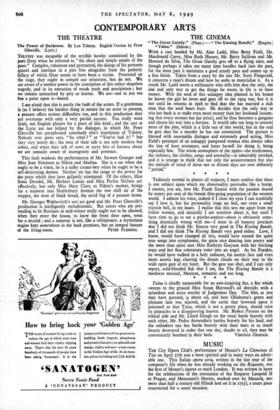CONTEMPORARY ARTS
THE THEATRE
The Power of Darkness. By Leo Tolstoy. English Version by Peter Glenville. ' (Lyric.)
TOLSTOY was incapable of the terrible howler committed by the poet Gray when he referred to " the short and simple annals of the poor." Complex, vehement and protracted, the doings of his peasants sprawl and interlace in a plot free altogether from the pathetic fallacy of which Gray seems to have been a victim. Presented on the stage, they ought to compel our atttention, but do not. We are aware of a sombre power in the conception of this rather shapeless tragedy, and in its execution of much truth and percipience ; but we remain untouched by pity or horror. We are—not to put too fine a point upon it—bored.
I am afraid that this is partly the fault of the actors. If a gentleman is (as I believe) the hardest thing in nature for an actor to present, a peasant offers serious difficulties too, and in this production they are overcome with only a very partial success. You really want Irish, not English players for a piece of this kind ; and the cast at the Lyric are not helped by the dialogue, in which Mr. Peter Glenville has paraphrased somebody else's translation of Tolstoy. Nobody ever quite says, " So what ? " or "You've had it! " but they very nearly do ; the tone of their talk is not only modern but urban, and when they talk of cows or carry bits of harness about we are uneasily aware of incongruity and pretence.
This fault weakens the performances of Mr. Stewart Granger and Miss Jean Simmons as Nikita and Akulina. She is a cat when she ought to be a vixen, he is a sulky corner-boy when he ought to be a self-destroying demon. Neither yet has the range or the power for the parts which they have gallantly attempted. Of the others, Miss Sonia Dresdel, Mr. Herbert Lomas and Miss Perlita Neilson act effectively, but only Miss Mary Clare, as Nikita's mother, brings for a moment into Shaftesbury Avenue the raw chill air of the steppes, the taste of black bread, the acrid fug of a peasant home.
Mr. Georges Wakhevitch's sets are good and Mr. Peter Glenville's production is intelligently melodramatic. But actors who are pre- tending to be Russians in mid-winter really ought not to be allowed, when they enter the house, to leave the front door open, even for a second ; and a samovar is not, like a refrigerator, a mysterious engine kept somewhere in the back premises, but an integral feature






































 Previous page
Previous page